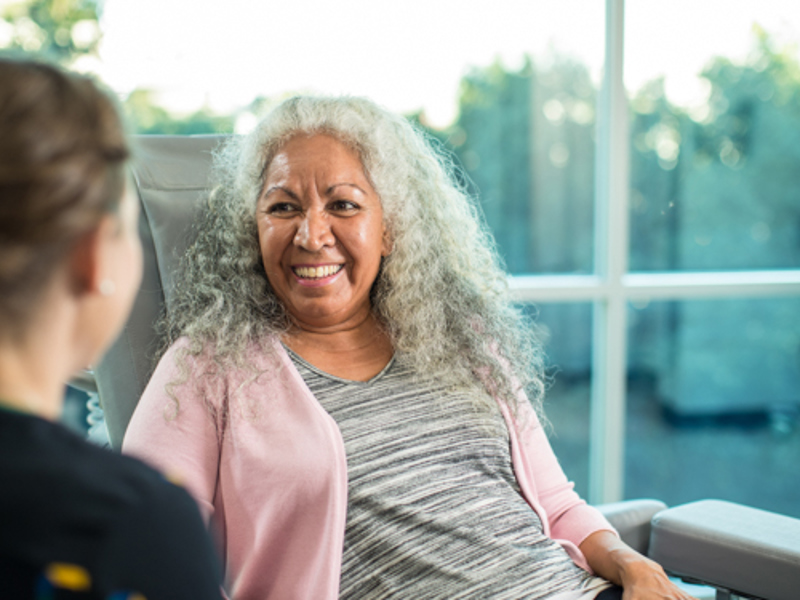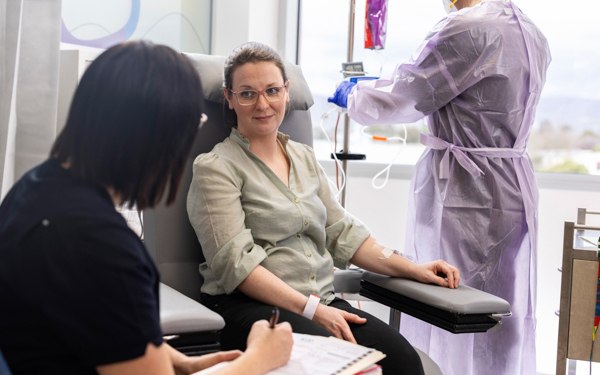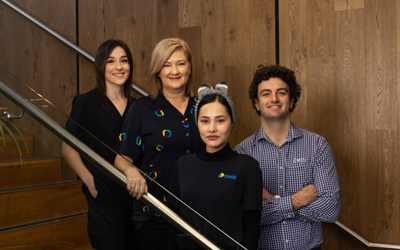Blood is essential to our health, carrying oxygen and nutrients throughout the body, helping to fight infections, and supporting overall wellbeing.
Haematology is the medical field that focuses on diagnosing and treating conditions that affect the blood, bone marrow, and lymphatic system. Haematologists are specialist doctors that treat blood cancers, conditions and disorders. Some of these blood cancers include leukaemia, lymphoma, myelodysplasia and myeloma, and blood disorders such as anaemia, iron deficiency, haemochromatosis, bleeding disorders and blood clots.
Icon has a large network including more than 50 clinical haematologists, 13 day oncology hospitals, more than 20 outreach clinics in local and regional areas plus access to telehealth services, that support patients looking for treatment advice for blood cancer and blood disorders.
Blood cancer
Blood cancers affect how blood cells are made and how they function, which can weaken the immune system and make it harder for the body to fight infections and stay healthy.
Types of blood cancer
Read through information about the different types of blood cancer below.
-
Leukaemia is a type of blood cancer that affects the bone marrow, where blood cells are made. It leads to an overproduction of abnormal white blood cells, which can crowd out healthy cells and make it harder for the body to fight infections, carry oxygen, and stop bleeding when needed. There are different types of leukaemia, and treatment options may include chemotherapy, targeted therapies, immunotherapy, and sometimes a stem cell transplant, also called a bone marrow transplant.
Myelodysplasia was previously referred to as ‘Pre-leukaemia’. It is a group of blood disorders that cause problems in the blood cells produced in the bone marrow and can transform into acute leukaemia in some patients.
-
Lymphoma is a blood cancer that affects the lymphatic system, which helps the body fight infections. It involves changes in a type of white blood cell called lymphocytes. Lymphoma can cause symptoms such as swollen lymph nodes, fevers, night sweats, and fatigue. There are two main types—Hodgkin lymphoma and non-Hodgkin lymphoma—each with different treatment approaches, including chemotherapy, radiation therapy, targeted therapies, and immunotherapy.
-
Myeloma, also referred to as plasma cell myeloma or multiple myeloma, is a cancer that affects plasma cells in the bone marrow. Plasma cells help the body fight infections by making antibodies, but in myeloma, they grow out of control and can weaken the bones, cause kidney problems, and lead to anaemia. Treatments for myeloma may include chemotherapy, immunotherapy, targeted therapy, and stem cell transplants, all of which aim to slow the disease and improve quality of life.
Find out more about how blood cancers are treated.
Blood Disorders
A blood disorder is similar to a blood cancer but is defined as non-malignant (meaning it is not cancerous). A general practitioner can help to diagnose a blood disorder and will likely refer you to a haematologist for treatment and management of your condition.
Common types of blood disorders
There are many different types of blood disorders. At Icon, we diagnose and treat the causes and symptoms of a wide range of blood disorders including:
Anaemia – Anaemia is a lack of red blood cells in the blood which result in reduced oxygen to the cells
Iron deficiency – Iron deficiency is a type of anaemia which causes tiredness, shortness of breath and dizziness
Haemochromatosis – Haemochromatosis is an inherited genetic condition which occurs when the body absorbs and improperly stores too much iron from the diet

How blood disorders are diagnosed and treated
Haematologists use different tests and procedures to diagnose and monitor blood disorders. These tests help determine the best treatment plan for each person.
Apheresis
Apheresis is a medical procedure that separates and removes certain parts of the blood while returning the rest back to the body. It can be used as initial therapy to remove abnormal cells in some blood cancers, collect stem cells for transplants, or treat other conditions that affect the blood.
Bone marrow collection
Bone marrow collection (also referred to as a bone marrow biopsy) is a simple and quick procedure used to take a small sample of bone marrow to check for blood cancers or other conditions. Bone marrow biopsies are usually performed in a day treatment centre under mild sedation.
We can help you
New treatments and medical research continue to improve the way blood disorders are managed. Advances in targeted therapies, immunotherapies, and bone marrow transplants are helping patients live longer, healthier lives. Early diagnosis and personalised treatment plans are making a difference, ensuring that people receive the care that best suits their condition.
There is a lot of information around understanding blood disorders, Icon’s experienced haematologists and care team can support you to explore the treatment options available and help you navigate your diagnosis to receive the best possible care.
Icon has haematologists located in Canberra (ACT), New South Wales, Queensland, South Australia and Western Australia.






